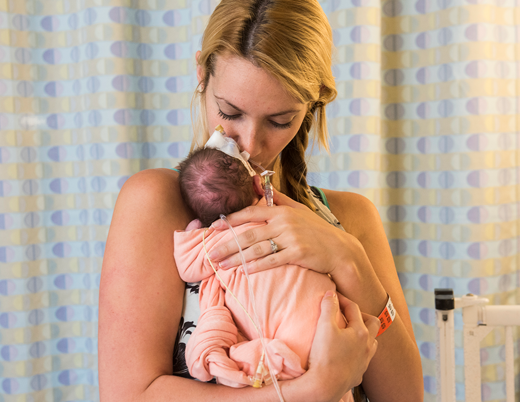When a dangerous disease resurges, how can new research overturn old ideas to keep patients safe in a changing world?
By the turn of the 20th century, 1 in every 7 people in the West had died from tuberculosis. The standard treatment involved clean air, sunlight and rest in a sanitorium. That changed in 1944 with the discovery of streptomycin, the first antibiotic for tuberculosis. Soon after, when sanitoriums shuttered in favor of antibiotics, streptomycin became a case study for how scientific research sometimes challenges common practice in pursuit of advancement. Today, Children’s Hospital Colorado hepatologist Amy Feldman, MD, PhD, is tackling another long-held belief in medicine through research that transforms vaccine eligibility and boldly confronts the age of misinformation.
Live viral vaccinations help a person build immunity by exposing them to an attenuated, or weakened version, of the actual virus. Some of the most important immunizations for children are in this category, including the measles, mumps, rubella (MMR) vaccine and the varicella zoster virus (VZV), or chickenpox, vaccine. They have proven so effective that in 2000, the Centers for Disease Control and Prevention (CDC) declared measles eliminated in the United States.
Despite their success, live viral vaccinations historically haven’t been given to liver and kidney transplant recipients, who are on lifelong immunosuppressive medications to prevent their bodies from rejecting the new organs. “People were concerned that live vaccines could cause a vaccine-strain viral infection in an immunocompromised patient,” Dr. Feldman says.
Era of uncertainty
Not administering live vaccines to solid organ transplant recipients seemed sound 20 years ago, when measles outbreaks in the U.S. were nearly nonexistent. But that decision has new implications in a changing world.
Global vaccine hesitancy has spiked in recent years, a trend fueled by many complex factors including social inequity, COVID-19 and the spread of misinformation online. As a result, the World Health Organization reported that 4.7 million children missed their first measles vaccine in 2021, and an additional 14.7 million children missed their second dose. That leaves just 81% of children worldwide fully vaccinated against measles compared to the 89-94% needed for herd immunity, causing an alarming spike in this dangerous, highly communicable disease.
“Measles remains in the air for up to two hours after an infected person sneezes," Dr. Feldman says. “In immunocompromised patients, such as transplant recipients, measles can result in pneumonia, encephalitis and potentially death. Sadly, there are no treatments to offer to a child who acquires measles.”
A string of outbreaks over the past decade demonstrates just how easily measles spreads in crowded places. In late 2014, an outbreak at Disneyland sickened 125 people, 50% of whom were not fully vaccinated (an additional 43% had unknown vaccination status). More recently, in 2023, an outbreak that began at an Ohio day care led to 85 measles cases — all among unvaccinated children. Air travel, too, poses a threat for the unvaccinated: If someone is exposed to the virus in an area with low immunization rates, they can bring the virus back home with them on the plane, potentially infecting people in their return destination as well as those they encountered along the way.
With measles cases rising, Dr. Feldman teamed up with University of Cincinnati colleague, Lara A. Danziger-Isakov, MD, to understand if it still made sense to leave organ transplant recipients unvaccinated. “We asked ourselves, ‘Is the historic recommendation still relevant? Is the risk-benefit ratio still the same?’”
To answer this question, Drs. Feldman and Danziger-Isakov created a consortium of 18 pediatric transplant centers that wanted to vaccinate eligible transplant recipients and collect data on vaccine safety, immunogenicity and clinical effectiveness.
"We hypothesized that the vaccines would be both safe and immunogenic, and that's exactly what we’ve found.”
Amy Feldman, MD, PHD
Testing vaccinations for transplant patients
Between Jan. 1, 2002, and Feb. 28, 2023, 281 children received a full dose of the MMR and/or VZV vaccines as part of Dr. Feldman’s study (1). Of this group, 96% were liver transplant recipients, 3% were kidney recipients and 1% were liver and kidney recipients.
"We hypothesized that the vaccines would be both safe and immunogenic, and that's exactly what we’ve found,” Dr. Feldman says. Data from participating centers showed that both vaccines resulted in immune protection in the majority of patients who'd received a transplant without making them sick. None of the children in the study developed measles, mumps or rubella, and five children developed a chickenpox rash that resolved within a week.
One year after vaccination, most of the children retained immune protection: 92% of children demonstrated protective antibodies against the measles virus, 94% showed protective immunity against rubella and 83% were protected against mumps. Additionally, 77% of children showed immunity from chickenpox.
The study design allowed each participating center to determine their own eligibility criteria for live vaccines, making the data more representative of the pediatric transplant population overall. “It created variability in the study so we could look at a cohort of patients with unique histories and different degrees of immunosuppression, and gain a bigger picture about more children,” Dr. Feldman says.
This research opens new doors for patients in need of a transplant, whose vaccination status typically prevents them from engaging in ordinary childhood activities that might expose them to illness, such as visiting a theme park or attending summer camp. A green light on vaccination means that these kids can finally be kids, the true impact of which is hard to measure.
"Now their parents have the opportunity to give them these vaccines, and they can develop protective antibodies,” Dr. Feldman says. “They can live out in the community without having to be scared that if they're exposed to measles or chickenpox, their child is going to become infected.”
While the study is still ongoing, these initial results are already inspiring action. The 18 institutions involved are moving forward with giving vaccines to transplant patients, and more centers have joined the consortium since the paper was published. This will provide Dr. Feldman’s team with more long-term data about how long immune protection lasts, which will help them understand when and if certain children may need boosters.
Paving the road to trust with research
Despite these wins, Dr. Feldman’s findings alone are not enough. She knows that this discovery, not unlike the first antibiotic for tuberculosis, must garner trust from both parents and providers before it can have a positive impact. “We need to find a way to implement new practices and guidelines that we know are right,” she says, “but that are very different from what we used to say.”
Dr. Feldman and her team are currently writing a grant for a project that will tackle this challenge. “We need to understand the barriers to implementation of novel recommendations, then develop educational tools to address and overcome these barriers,” she says. Their main goal is to implement new, evidence-based vaccination guidelines that reach parents and providers across the country.
"Providers want to be innovative, but they're scared that they could give measles to someone via the shot, even though that's never happened in a transplant recipient,” Dr. Feldman explains. “That's why we needed to do this study — to provide people with enough data to feel confident about making a practice change.”
Upending long-held convictions is neither easy nor comfortable, yet it’s intrinsic to human progress.
“We're living in a different world than we were 10 or 20 years ago,” Dr. Feldman says, referring to the rise in vaccine hesitancy and global measles resurgence.
Consulting new research and communicating with other experts is important for helping providers identify when a previously ineligible transplant patient may become a good candidate. For example, different institutions have their own criteria for vaccine eligibility, such as how long a patient must wait after their body rejects a transplant. New research can help standardize these practices and determine if it might be safe for a child to get vaccinated sooner than previously believed.
“This is a great example of collaboration between primary care doctors who most frequently give vaccines, and their subspecialists and transplant teams,” Dr. Feldman says. “They can discuss together which patients might be appropriate, and we can start thinking about giving vaccines to more and more kids who weren’t previously eligible.”
Now that data proves the safety of live vaccines for most patients in need of a transplant, fear of change may be the greatest obstacle preventing them from a less quarantined life. Assuaging these concerns by confronting misinformation is no doubt a gargantuan task, but for Dr. Feldman, it’s the very notion of freedom that propels her through such daunting work.
“Our goal for transplant recipients is that they live normal lives, and live viral vaccines help make that possible,” Dr. Feldman says. “We want them at college; we want them to be able to go to Disneyland; we want them out on an airplane traveling the world.”
Citations
- Feldman, Amy G et al. “Safety and Immunogenicity of Live Viral Vaccines in a Multicenter Cohort of Pediatric Transplant Recipients.” JAMA network open vol. 6,10 e2337602. 2 Oct. 2023, doi:10.1001/jamanetworkopen.2023.37602.
Featured researchers

Amy Feldman, MD, PhD
Medical Director, Liver Transplant Program
Digestive Health Institute
Children's Hospital Colorado
Associate professor
Pediatrics-Gastroenterology, Hepatology and Nutrition
University of Colorado School of Medicine





 720-777-0123
720-777-0123










